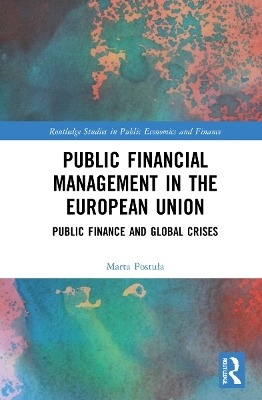
Public Financial Management in the European Union
Public Finance and Global Crises
Seiten
2022
Routledge (Verlag)
978-1-032-11890-1 (ISBN)
Routledge (Verlag)
978-1-032-11890-1 (ISBN)
Reveals how to create efficient institutions and coordinate policy on a transnational scale to ensure European Union integration can best meet social needs. Offers a proposal of how to manage global, European and national public goods across three areas: environmental protection, transnational infrastructure projects and social policy.
This book reveals how to create efficient institutions and coordinate policy on a transnational scale to ensure that European Union integration can best meet social needs. It offers a combined technocratic and humanist perspective on the discussion of public financial management. The state, as part of its public policy, should seek to preserve our social and environmental values, yet there are mounting imbalances in society which point to the growing role of the state in minimising them. Under such circumstances, it is worth reflecting on how new challenges could require updated, more complex formulas, to deal with crises in current times and for social and economic policy making by states and the European Union generally, which would ensure their compatibility with the world financial markets. The work offers an in-depth and unique performance analysis of European Union institutions compared to the national entities of EU Member States. It contributes to the ongoing debate on global public goods and the processes involved in managing their provision. Further, it discusses public finance management instruments, indicating their historical evolution in practice and their effectiveness measured with the Human Development Index. The author presents a proposal of how to manage global, European and national public goods across three areas: environmental protection, transnational infrastructure projects and social policy. The book analyses public financial management instruments used during the recent pandemic, making a distinction between regular and emergency instruments and assessing their effectiveness in specific economic situations. This will be of interest to researchers and students of economics and finance, as well as decision makers and practitioners from governments, international organisations and specific non-governmental organisations concerned with issues of public finance management.
This book reveals how to create efficient institutions and coordinate policy on a transnational scale to ensure that European Union integration can best meet social needs. It offers a combined technocratic and humanist perspective on the discussion of public financial management. The state, as part of its public policy, should seek to preserve our social and environmental values, yet there are mounting imbalances in society which point to the growing role of the state in minimising them. Under such circumstances, it is worth reflecting on how new challenges could require updated, more complex formulas, to deal with crises in current times and for social and economic policy making by states and the European Union generally, which would ensure their compatibility with the world financial markets. The work offers an in-depth and unique performance analysis of European Union institutions compared to the national entities of EU Member States. It contributes to the ongoing debate on global public goods and the processes involved in managing their provision. Further, it discusses public finance management instruments, indicating their historical evolution in practice and their effectiveness measured with the Human Development Index. The author presents a proposal of how to manage global, European and national public goods across three areas: environmental protection, transnational infrastructure projects and social policy. The book analyses public financial management instruments used during the recent pandemic, making a distinction between regular and emergency instruments and assessing their effectiveness in specific economic situations. This will be of interest to researchers and students of economics and finance, as well as decision makers and practitioners from governments, international organisations and specific non-governmental organisations concerned with issues of public finance management.
Marta Postuła is Head of the Finance and Accounting Department at the Faculty of Management, University of Warsaw, Poland.
Introduction 1. Contemporary challenges to the European social and economic policy 2. Macroeconomic coordination policy tools recommended and assessed at EU level3. Public finance management in EU regulations and its effectiveness 4. The evolution of the role, scale and directions of impact of EU funds 5. Identification of domestic, European and global-level tasks as a process that improves their efficiency Conclusion
| Erscheinungsdatum | 20.04.2022 |
|---|---|
| Reihe/Serie | Routledge Studies in Public Economics and Finance |
| Zusatzinfo | 36 Tables, black and white; 10 Line drawings, black and white; 10 Illustrations, black and white |
| Verlagsort | London |
| Sprache | englisch |
| Maße | 156 x 234 mm |
| Gewicht | 453 g |
| Themenwelt | Sozialwissenschaften ► Politik / Verwaltung ► Staat / Verwaltung |
| Wirtschaft ► Betriebswirtschaft / Management ► Rechnungswesen / Bilanzen | |
| ISBN-10 | 1-032-11890-3 / 1032118903 |
| ISBN-13 | 978-1-032-11890-1 / 9781032118901 |
| Zustand | Neuware |
| Informationen gemäß Produktsicherheitsverordnung (GPSR) | |
| Haben Sie eine Frage zum Produkt? |
Mehr entdecken
aus dem Bereich
aus dem Bereich
Organisationen steuern, Strukturen schaffen, Prozesse gestalten
Buch | Softcover (2024)
Rehm Verlag
CHF 53,20


